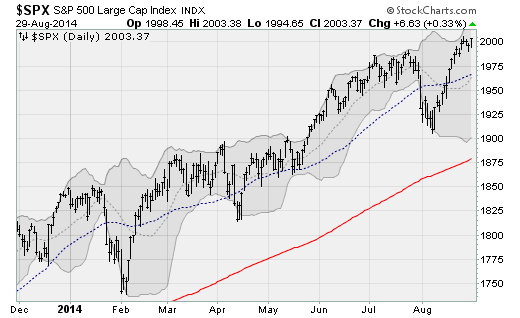Investors wonder: Is it time to sell stocks?
With the S&P 500 still flirting with the 2,000 level -- which it closed above for the first time ever this week -- investors are wondering is the bull market has any more room to run. It is time to press their bets? Or pull chips off the table?
This decision is being complicated by the escalation of the situation in Ukraine on reports of Russian military troops, armor, and artillery hitting Ukrainian forces. Russian stocks are down hard, with the Market Vectors Russia (RSX) down more than 6.5 percent from its highs last week.
Stocks wilted Friday heading into the long Labor Day holiday weekend. The Standard & Poor's 500 rose six points to finish at 2,003, which is an all-time high, but barely above the 2,000 mark the index first hit on Monday. The Dow Jones industrial average rose 18 points to 17,098 and the Nasdaq composite rose 22 points to 4,580.
Investor worries include, not only the situation with Russia, but a series of big potential hurdles that await as summer draws to a close.
Adding to concerns has been the very anemic trading activity seen this week as stocks marched to new highs, featuring the lowest non-holiday trading volume of the year. That suggests a lack of conviction. And it leaves stocks vulnerable to any negative catalyst in the weeks to come.
Central banks will be in focus starting the first week of September thanks to an eagerly awaited policy decision from the European Central Bank.
Amid stillhigh unemployment and a rising deflationary threat, expectations have been rising that the ECB -- which just cut one of its policy interest rates into negative territory in an attempt to kickstart growth -- will launch a bond buying stimulus program of the kind the Federal Reserve has been conducting since late 2012.
Jennifer McKeown at Capital Economics doesn't expect the ECB to take action next week and instead is looking for officials to set the stage for action at an upcoming meeting. Mindful of a recent downturn in Europe's economic performance, McKeown believes the ECB will wait to see how much of an impact previously announced measures are having.
After ECB President Mario Draghi made clear at a recent speech at the Jackson Hole central bankers' symposium that he was concerned about the renewed troubles facing the eurozone, a lack of any new action could pressure stocks in the near term.
After this, focus will shift to the Federal Reserve, which is on track to end its QE3 bond buying program in October amid strength in the U.S. economy and the best run of job creation since the 1990s. September's policy meeting will tee up the fact that in November, for the first time since 2012, the Fed will no longer be buying tens of billions of bonds on a monthly basis.
This is the third iteration of the Fed's bond buying stimulus. Periods of no activity in 2010 and 2011 were accompanied with difficult pullbacks for the stock market as investors reacted negatively to the lack of Fed stimulus. It is likely we'll see similar volatility appear this time as well.
And finally, let's not forget that a very contentious mid-term election looms in November. And with that, we're likely to see the return of political brinkmanship over the budget, the debt ceiling and the funding of the government of the type we haven't seen since last fall.
In response, I'm recommending investors take on a more defensive positioning as the summer draws to a close -- trimming winning positions such as JCPenney (JCP) which gained 10 percent for clients over the last two weeks, raising a little cash, and preparing for what should be a bumpy ride towards the end of the year.
